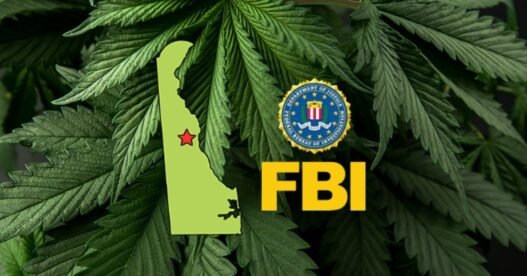Delaware’s hopes for launching adult-use cannabis sales this spring have hit an unexpected roadblock, and it’s coming from the federal level.
The FBI Says “Not So Fast”
State cannabis regulators just announced that the Federal Bureau of Investigation (FBI) has rejected Delaware’s application for a service code needed to run criminal background checks for the new adult-use market. This fingerprinting system is required by state law, but apparently, the way Delaware wrote that law doesn’t satisfy federal requirements.
“After review of the authorizing statute, the FBI advised that Title 4 of the Delaware Code must contain language explicitly identifying the categories of persons required to obtain a background check,” the Office of the Marijuana Commissioner (OCM) explained in their announcement.
In simpler terms: Delaware’s law is too vague about who needs background checks, and the FBI won’t play ball until that’s fixed.
Back to the Drawing Board
Now Delaware officials must go back to state lawmakers to draft new legislation that meets FBI standards. The good news is that the General Assembly is in session until June 30, so there’s time to fix this. The bad news? This creates an indefinite delay for the 125 businesses that were awarded adult-use licenses and are eager to get started.
Many of these business owners are likely paying rent on facilities that can’t generate revenue until this issue is resolved—a potentially costly delay for small operators.
A Long Road to Launch
This setback is especially frustrating considering the lengthy process Delaware has already gone through:
- April 2023: Former Governor John Carney allowed adult-use legalization bills to become law without his signature
- May 2024: The General Assembly passed follow-up legislation with “technical corrections”
- October 2024: The state awarded 110 licenses for cultivators, manufacturers, and testing labs
- December 2024: Another 30 dispensary licenses were awarded
- January 2025: Then-commissioner Rob Coupe set a March 2025 target for sales
A Possible Workaround?
There might be a shortcut available. Delaware’s existing medical cannabis businesses—which operate 13 compassion centers—already have FBI background checks from the medical program. The state passed legislation allowing these businesses to convert to adult-use, which could potentially let sales begin through these established operators.
However, this creates a new problem: giving medical operators a head start could undermine the state’s equity goals and put the 125 new licensees at a competitive disadvantage.
Zoë Patchell from the Delaware Cannabis Advocacy Network voiced this concern: “The biggest concern is if OMC allows the existing medical marijuana businesses to begin adult-use sales in the spring, while the licensing process for all the new businesses has been stalled due to no fault of their own, which is just fundamentally unfair.”
What’s Next?
Delaware officials say they’re working “expeditiously” with lawmakers to develop legislation that will satisfy the FBI’s requirements. In the meantime, cannabis consumers and entrepreneurs alike will have to exercise patience as the state navigates this unexpected federal hurdle.
For the medical operators potentially converting to adult-use, significant fees await—$100,000 for manufacturing, retail, and testing permits, and $200,000 for cultivation permits—potentially generating $4 million earmarked to support social equity operators in the market.



















